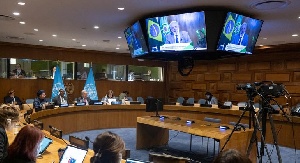Africa News of Thursday, 24 April 2025
Source: www.ghanawebbers.com
Africa: World Leaders Rally for 'Full-Speed' Climate Action Ahead of COP30
On Wednesday, UN Secretary-General António Guterres and Brazilian President Luiz Inácio Lula da Silva hosted a virtual summit. They gathered 17 leaders from major economies and climate-vulnerable countries. The aim was to boost global climate efforts ahead of COP30 in Brazil.
This meeting was part of a strategy to enhance action under the Paris Agreement. It also aimed to build momentum for stronger national climate plans due in 2025. The two-hour session included representatives from China, the European Union, and other key groups.
Mr. Guterres called it one of the most diverse climate meetings in recent times. He emphasized its powerful unifying message. "The world is moving forward," he stated at a press briefing. "No group or government can stop the clean energy revolution."
Many leaders pledged ambitious new climate plans, known as National Determined Contributions (NDCs). Guterres described this as a "strong message of hope." He noted that President Xi Jinping confirmed China's updated NDCs would cover all economic sectors and greenhouse gases.
These pledges offer a chance to create a bold path for the next decade. They also help accelerate the transition from fossil fuels to renewable energy. Guterres called renewable energy production "the economic opportunity of the century."
He said it is the "pathway out of climate hell." The clean energy sector is booming, creating jobs and driving growth worldwide. Prices for renewables have dropped significantly, providing energy security and reducing dependence on fossil fuels.
Since the 2015 Paris Agreement, projections for global warming have decreased. Current plans suggest a rise of 2.6°C this century if implemented fully. However, this still exceeds the goal of limiting temperature rise to 1.5°C above pre-industrial levels.
Guterres urged leaders to submit national plans that align with this target by covering all greenhouse gases and sectors. He emphasized commitment to achieving net zero emissions by 2050.
A senior UN official described Wednesday's summit as "just another step" in maintaining political momentum against climate change. The invitees were small but representative, including major economies and vulnerable nations.
"This is an important year," they noted, highlighting the Paris Agreement's tenth anniversary and upcoming deadlines for new climate plans. This meeting reminded leaders that collaboration remains crucial.
A senior Brazilian official stated that the upcoming UN climate summit in Belém will focus on implementation rather than negotiations alone. They stressed that tangible outcomes are essential for restoring trust in multilateralism.
"We want to show that multilateralism means making agreements real," they concluded.











